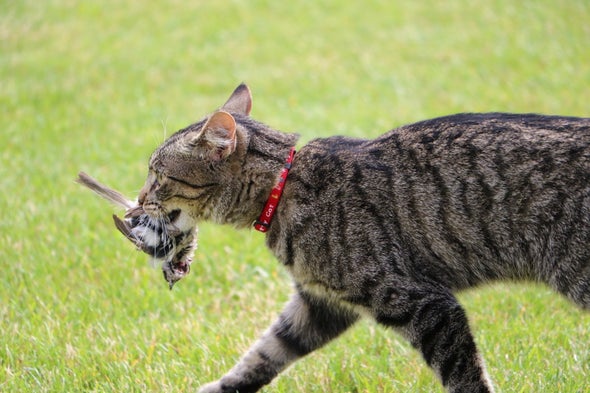(单词翻译:单击)
听力文本
This is Scientific American's 60-second Science, I'm Jason Goldman.
Domestic cats that live or go outside kill lots of wild animals. Recent studies find that outdoor cats in North America take out between 10 and 30 billion birds and mammals each year.
Still, it hasn't been clear what kind of an impact the world's 600 million pet cats have on wildlife populations—and whether that impact poses a threat to biodiversity conservation.
"Anyone who has a cat sees their cats bring animals home. And the question is, 'Well, does it matter?' And especially, we wanted to know, 'Where are the cats actually hunting? Are they hunting in their backyards? Or are they going out into the nature preserves?'"
North Carolina State University zoologist Roland Kays.
Together with colleagues in the U.K., Australia and New Zealand, Kays distributed small GPS trackers to citizen-scientist cat owners. They attached the trackers to their cats' collars. In all, more than 900 pet cats were tracked this way, all of which were routinely allowed to roam freely outside.
Some cats were true explorers. One British cat called Max walked almost two kilometers back and forth along a road between two neighboring villages—twice! But the majority were homebodies, rarely straying more than 100 meters from home. In other words, they used their own backyards, plus those of a few neighbors, as their hunting grounds. The findings are in the journal Animal Conservation.

A single pet cat doesn't kill as many animals as a wild cat does to survive. But the pet's impact happens in a much smaller area. So in a given area, say 100 square meters, pet cats kill between two and 10 times as many other animals as do similarly sized wild predators.
"We were able to put this into kind of a currency, into a value of 'How many prey animals does a pet cat kill per hectare, sort of per area, per year?' And that's something we can also estimate for wild predators. So we were able to estimate this for a wild cat called the jungle cat, which is about the same size. And they kill a lot more per cat because they have to hunt to get everything that they eat, whereas the pet cats get their food bowl. But they hunt over a massive area, compared to the pet cats."
And in some places, including California, Florida, Australia and elsewhere, cats were an important threat to some species that are already in trouble.
"On one hand, it's kind of good news that the cats aren't going out further abroad. But it's bad news that they're quite likely to have an impact on animals they share space with near their houses."
With so much killing concentrated around people's houses, the positive impacts of urban wildlife—like the beauty of songbirds or the way small lizards can control insect pests—could get washed away in precisely the areas where those benefits are most appreciated. So when conservationists implore cat owners to keep their pets indoors, scientific evidence agrees.
Thanks for listening for Scientific American's 60-second Science. I'm Jason Goldman.
参考译文
这里是科学美国人——60秒科学系列,我是杰森·古德曼。
在外生活或外出的家猫会杀死许多野生动物。最新研究发现,北美的户外猫每年会干掉100亿到300亿只鸟和哺乳动物。
不过,目前尚不清楚全球6亿只宠物猫对野生动物种群有何影响,以及这种影响是否对生物多样性保护构成威胁。
“养猫的人都看见过猫将动物叼回家。问题是‘这重要吗?’特别是,我们想知道‘猫到底在哪里捕猎?是在后院还是到自然保护区捕的猎?’”
北卡罗来纳州立大学的动物学家罗兰·凯斯说到。
凯斯和英国、澳大利亚和新西兰的同事一起向养猫的公民科学家分发小型GPS追踪器。他们将追踪器贴在猫的项圈上。他们用这种方法一共追踪了900多只宠物猫,这些猫都像往常一样被允许外出自由活动。
有些猫是真正的探险家。一只名为马克斯的英国猫沿着两个相邻村庄之间的公路来回走了近两公里!但大多数猫都很宅,很少离家100米以上。换句话说,它们将自家后院以及几个邻居的后院当做狩猎场。这项研究发表在《动物保护》期刊上。
单只宠物猫不会像野猫为了生存而杀死那么多动物。但宠物猫的影响范围要小得多。比如在100平方米的区域内,宠物猫杀死的动物数量是体型相似的野猫的2到10倍。
“我们能将此转换成一种货币,估算‘一只宠物猫每年在每公顷或第片区域内杀死多少只猎物’。我们还能估算野猫的情况。因此,我们可以估算与家猫体型相似、被称为森林猫的一种野猫的情况。这种猫杀死的猎物数量比家猫多得多,因为它们必须依靠捕猎获得一切食物,而宠物猫只需去食盆享用食物。但与宠物猫相比,它们的儿捕猎面积更大。”
在加利福尼亚州、佛罗里达州、澳大利亚等地,猫是某些已经陷入困境的物种的重大威胁。
“一方面,猫不去太远的地方是个好消息。但坏消息是,它们很可能会对与它们共享空间的动物产生影响。”
由于人类住宅周围集中了如此多的“杀戮”,城市野生动物的积极影响,比如鸣鸟的美丽或小蜥蜴控制害虫的能力,可能会被清洗掉,而遭清洗的地点恰恰是最欣赏这些益处的区域。因此,自然环境保护主义者恳求养猫人让猫待在室内的做法,得到了科学证据的支持。
谢谢大家收听科学美国人——60秒科学。我是杰森·古德曼。
译文为可可英语翻译,未经授权请勿转载!
重点讲解
重点讲解:
1. take out 干掉;摞倒;
In my neighbourhood, the local crack dealers would have taken him out a long time ago.
我们这片的本地毒贩早就想废了他了。
2. in all 总共;合计;
In all, she has eight costume changes.
她总共换了8次演出服。
3. back and forth 来回;往返;
He paced back and forth.
他来回踱步。
4. compared to 与…相比;和…比起来;
I was at a disadvantage compared to the younger members of the team.
与队里较年轻的队员相比,我处于不利地位。


